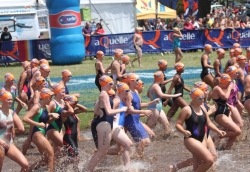|
2012-09-14 The SETE 2012 Conference kicked off on Wednesday (13 September) with an impressive array of international and local high profile speakers. The conference, facilitated Kwena Moabela, allowed for mostly an interactive platform to discuss issues surrounding sports tourism in South Africa and strategies to enhance it. Spokesperson for the eThekwini Municipality, Logie Naidoo, opened the conference by welcoming all conference participants to South Africa’s Sunshine Capital, KwaZulu-Natal. Naidoo was followed by an address by The MEC for Arts Culture, Sport and Recreation, Ntombikayise Sibhidla-Saphetha, who focused on KZN and its facilities. The crux of this presentation was to demonstrate that KZN is a strong and capable candidate to host more of these mega events.James Seymour, the CEO of Durban KZN Conventions Bureau, also stated that KZN’s aim is to showcase itself as a premier event destination not only in South Africa, but worldwide. He stated that Durban and the rest of the province is committed to continue supporting events provided that they are based on well formulated proposals, demonstrate a clear return on investment and ideally have significant private sector support and are in line with the provincial growth and development strategy. Seymour also stated that KZN aims to measure the impact that the events have on the province as well as learn from past mistakes such as failed bids.Deputy Minister of Sport and Recreation South Africa, Gert Oosthuizen, is very positive about the future of sports tourism in South Africa as he feels that it is an area which the country can really expand on. In his address, Oosthuizen focused on the benefits of sports tourism in the country and how it can create mutual benefits for both the private and public sectors. These benefits, according to Oosthuizen, are not only directly linked to the event itself but will also have spin-off benefits which will upgrade other sectors such as hospitality and transport which will continue to benefit South Africa long after the event has concluded. He noted that sports tourism has social value as well: “Sport creates a cultural exchange which transcends cultural barriers and gives the term ‘Global Village’ a whole new meaningâ€. Bearing in mind that sports tourism brings in approximately R6 billion to South African Tourism every year, Oosthuizen stressed the importance of forming partnerships between National Federations and Government which can be developed through new strategies. Gideon Sam, President of SASCOC, was outspoken about his overview of the role of SASCOC in positioning South Africa as a sports tourism destination. Sam also stressed time and again that delegates and the South African sports sector as a whole needs to be more active in its bid to grow sport tourism in the country: “South Africans need to stop being complacent and feel that we are owed because we made it through Apartheidâ€. Advocate Brenda Madumise, Chairperson of CATHSSETA, spoke along similar lines with Gideon Sam in that strategies in sport tourism needs to be less ideological but rather more practical, especially when looking for support from entities such as CATHSSETA . The conference concluded yesterday (13 September) with a number of workshops run by prominent experts in the sport and events tourism sector. For more information and access to presentations, visit www.sportsandevents.co.za
|
Copyright © 2026 KwaZulu-Natal Top Business
